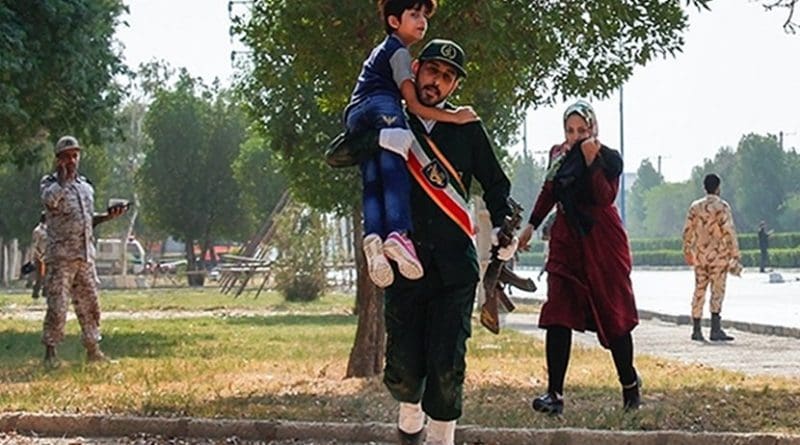Iran And Its Arab Neighbors Post The Ahvaz Attack – Analysis
By IPCS
By Majid Izadpanahi*
On 22 September 2018, a military parade in Ahvaz, Khuzestan, Iran, to celebrate the anniversary of the start of Iran-Iraq war (1980-88) was struck by a terrorist attack, resulting in the deaths of 25 people, including civilians. A separatist group took the responsibility of the attacks, but soon, the Islamic State (IS) claimed that they had plotted the attacks. More importantly, these attacks have domestic and regional consequences. The significance of the attack in Ahvaz is different from the previous attack on the Iran’s parliament that IS carried out in June 2017. First, the Iranian officials did not specifically mention the name of any country after the 2017 attack albeit they indirectly accused Saudi Arabia. Second, it was the first time Iranian officials categorically mentioned UAE as one of the perpetrators of the attacks. Ayatollah Ali Khamenei blamed Saudi Arabia and the United Arab Emirates (UAE) for being responsible for the agents of the attacks. Iran’s Foreign Ministry also summoned UAE’s charge d’affaires over a controversial comment by one the Emirati officials.
On the domestic front, these attacks can adversely impact any movement or objection to Tehran’s economic and environmental policies as the government could easily flag security concerns and increase repression, and worsen the economic and environmental condition of Khuzestan province. On the regional front, despite the fact that the regional (and international) policies of the Iranian Presidents, including those of Hassan Rouhani, differ remarkably from other influential institutions (that are considered conservative and bearing theocratic attitudes), they too made similar statements based on punishment of the agents of the attacks.
Context and Perceptions
Historically, relations between Iran and the Arab countries have been based on suspicion and competition. Since the Sheikh Khazal separatist activities (1922-24), Iran has suspected some Arab countries of trying to provoke some Iranian Arabs in Khuzestan Province-the economic heart of Iran-to pressurise the Iranian government. The 1979 revolution in Iran aggravated the situation by adding another aspect to this historic rivalry, namely the revolutionary ideology (based on Shiism). The post-revolutionary policy of the Islamic Republic based on ‘Export of the Revolution’ generated a fear among the Arab states that revolutionary Iran intended to spread revolutionary ideology among their nations and eventually overthrow the Arab states. Generally speaking, relations between Iran and the Arab countries have not been good. Iran and Egypt have not had a good relationship since 1979; Iran and Saudi Arabia snapped relations twice-after the 1987 Hajj incident, and after an extremist group attacked the Saudi Embassy in Tehran in 2016.
Now, Iran and Saudi Arabia have entered an era of enmity that has led to an escalation of the proxy war in Syria, Iraq, and Yemen. Moreover, barring its relationship with Oman, Iran’s relations with the Arab states of the Persian Gulf have been both shaky and vulnerable to potentially rash decisions. Incidentally, the Organization of Islamic Cooperation, and the Arab League neither reacted to the Ahvaz attack nor condemned it. Ironically, Palestinian groups supported by the Islamic Republic have not reacted either. Due to Iran’s revolutionary policies, the country has been significantly isolated in the region, among the Arab countries, and some other Islamic countries.
In the Arab states’ point of view, Iran’s revolutionary ideology is viewed as a threat to their sovereignty. Moreover, Iranian presence in Syria and Iraq has increased this fear, pushing the Arab countries more towards Israel and towards placing their hopes in US President Donald Trump’s government to isolate Iran. However, officials in Tehran have shown no willingness to make any concessions with regard to the revolutionary ideology because the entire system is based on ideology and they incorrectly believe that any compromise in their revolutionary ideology would damage their legitimacy.
Looking Ahead
A pragmatic approach is required to address this state-of-affairs. On one hand, the Arab states should respect Iranian sovereignty and territory, and avoid provocative statements and actions. On the other hand, Iranian officials should cease their double-standard policy towards Arab countries and understand that the Arab countries consider Tehran’s revolutionary ideology as a threat. In the case of Egypt, it would be illogical for Iran to name one of the streets in Tehran after Khalid Islambouli and simultaneously expect restoration of relations. With regard to Saudi Arabia, officials in Tehran should respect Saudi Arabia’s sovereignty and avoid religious competition with the kingdom. In the situation post the Ahvaz attack, it is important to bear in mind that any uncalculated decision could likely lead to more direct conflict. Therefore, all the states should avoid reacting rashly. Additionally, given how Russia is the only country that has been able to balance relations with all of the powerful states in the West Asia, regional powers and rivals, namely Iran, Saudi Arabia, Turkey and Israel can consider this as an opportunity and identify Russia as a mediator. Officials of these states can meet in Russia and eliminate misunderstandings that have emerged over the past four decades. These officials can begin by understanding each other’s security concerns, and subsequently plan a roadmap that can serve to address all their concerns. Finally, considering the fact that global warming is adversely impacting the West Asian region, countries in the region would do better focus on tackling common environmental threats and increase economic engagement rather than empowering ideological rivalries. If the countries develop robust economic ties, they will be less motivated to take aggressive foreign policy stances or engage in conflicts. The Islamic Republic and the Arab states should understand the fact that they are destined to live together.
*Majid Izadpanahi is an intern at the Centre for Energy Policy of the Institute of International Relations Prague.

